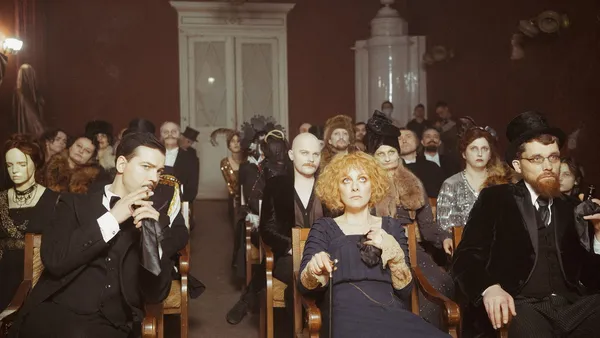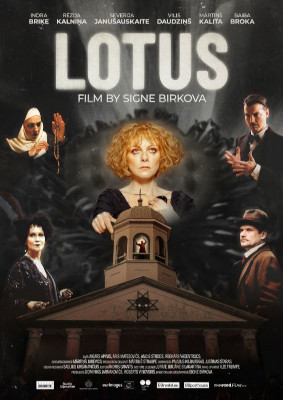Eye For Film >> Movies >> Lotus (2024) Film Review
Lotus
Reviewed by: Jennie Kermode

More of a poem than a conventional narrative, Signe Birkova’s vividly detailed feature début is a luscious tribute to the world of silent film, a disjointed and dreamlike fable about the strange days in 1919 when the future seemed about to be born, before women had been squeezed out of creative roles and history had veered off along the path that brought us to where we are today. That it begins with a visit to a fortune teller teases us with the idea that there are many possible paths but, as the woman with the swinging crystal tells us shortly after vomiting out her own heart and turning into a nun, just one inescapable fate.
The person consulting the fortune teller is Alice von Trott (Severija Janušauskaitė), whose curiosity about her fate stems from the discovery that she has inherited a mansion in a remote part of Latvia. This turns out to be a fount of decay, from the mouldering red carpet spread upon the steps to greet her to the obvious rot in every bit of timber and the damp gradually crawling up the walls. It is home to dour-faced servants fearful of being sold off along with the furniture, but also to rumours of hidden von Trott gold. The belief that Alice might know where this is located immediately puts her in danger, whilst it also attracts the attention of those who have traditionally looked to the aristocracy for patronage: a theatre troupe, Viva La Mort; and its emerging competitor, Emil Keyserling (Martins Kalita), and ethnophile and cinephile obsessed with the potential of the new medium.

This may seem like the perfect setting for the story of a damsel in distress, but Alice is the other sort of Gothic heroine, strong willed and bold, protecting her own agency to the degree that she is ready to leap off a cliff rather than give in to threats. The fact that she has only one leg suggests that this is not her first rodeo. Bursting with creative potential, she eagerly involves herself with the troupe, even as it becomes clear that it has cult-like qualities and brutal initiation rites; and she becomes determined to make her own film. The actors introduce her to the idea that a country is ruled by the power of art, whilst Keyserling’s love of his medium is expressed by the romantic notion that within the camera, darkness surrenders itself to light.
Flitting from scene to scene with an increasing disregard for the constraints of logic, the film beguiles hesitant viewers with its gorgeous sets and costumes, which are strongly rooted in the traditions of early cinema and flush with clever references for fans to enjoy. Cinematographer Martins Jurevics makes the unadorned landscapes of the region look every bit as lush, his handsomely coloured forests reminiscent of the stained images popular in the early 1910s, when film wasn’t nearly as black and white as most people now imagine. Birkova also challenges the past imaginary with her playful use of split screen technique and other such devices, whilst conversation between Keyserling and Alice emphasises the furious pace at which the technology of the period was developing.
Ambitious as Lotus itself is, it doesn’t always hit the mark. There’s too much going on to allow much depth of character development, and like many an inexperienced creator, Birkova sometimes forgets that we don’t know these people as well as she does. Elsewhere, scenes rattle on for too long as she tries to cram in every idea she has for them, losing momentum in the process. As a result, the film occasionally drags, but thankfully there is never any shortage of visual treats to enjoy. At this level, she is every bit as committed as her heroine, and one longs to see more from both.
Reviewed on: 25 May 2025
















